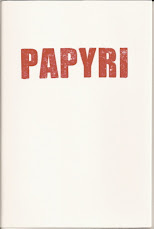skip to main |
skip to sidebar
31 Days (25)

Georges Perec
(1936-1982)
from La Disparition
Trois cardinaux, un rabbin, un amiral franc-maçon, un trio d'insignifiants politicards soumis au bon plaisir d'un trust anglo-saxon, ont fait savoir à la population par radio, puis par placards, qu'on risquait la mort par inanition. On crut d'abord à un faux bruit. Il s'agissait, disait-on, d'intoxication. Mais l'opinion suivit. Chacun s'arma d'un fort gourdin. "Nous voulons du pain ", criait la population, conspuant patrons, nantis, pouvoirs publics. Ça complotait, ça conspirait partout. Un flic n'osait plus sortir la nuit.
A Mâcon, on attaqua un local administratif. A Rocamadour, on pilla un stock : on y trouva du thon, du lait, du chocolat par kilos, du maïs par quintaux, mais tout avait l'air pourri. A Nancy, on guillotina sur un rond-point vingt-six magistrats d'un coup, puis on brûla un journal du soir qu'on accusait d'avoir pris parti pour l'administration. Partout on prit d'assaut docks, hangars ou magasins.
Plus tard, on s'attaqua aux Nords-Africains, aux Noirs, aux juifs. On fit un pogrom à Drancy, à Livry-Gargan, à Saint-Paul, à Villacoublay, à Clignancourt. Puis on massacra d'obscurs trouffions, par plaisir. On cracha sur un sacristain qui, sur un trottoir, donnait l'absolution à un commandant C.R.S. qu'un loustic avait raccourci d'un adroit coup d'yatagan.
On tuait son frangin pour un saucisson, son cousin pour un bâtard, son voisin pour un croûton, un quidam pour un quignon.
Dans la nuit du lundi au mardi 6 avril, on compta vingt-cinq assauts au plastic. L'aviation bombarda la Tour d'Orly. L'Nhambra brûlait, l'Institut fumait, l'Hôpital Saint-Louis flambait.
Three cardinals, a rabbi, an masonic admiral, a trio of insignificant politicos subject to the arbitrary will of an Anglo-Saxon cartel, informed the population by radio, then by billboards, that they risked death by starvation. They ended up believing in this false rumour. It was, people said, like an intoxication. But public opinion followed. They all armed themselves with strong bludgeons. "We want bread," shouted the population, jeering at bosses, the wealthy, the authorities. They plotted, they conspired everywhere. A police officer did not dare to go out any more at night.
In Mâcon, they attacked an administrative office. In Rocamadour, they ransacked a stockpile: they found tuna, milk, kilos of chocolate, quintals of corn, but everything seemed rotten. In Nancy, they guillotined twenty-six magistrates on a roundabout just like that, then they burned an evening newspaper which they accused of having taken the side of the administration. Everywhere they took by assault warehouses, sheds or stores.
Later, they attacked North-Africans, the Blacks, Jews. They had a pogrom in Drancy, in Livry-Gargan, in Saint-Paul, in Villacoublay, in Clignancourt. Then they slaughtered obscure bystanders, for pleasure. They spat on a sexton who, on a sidewalk, gave absolution to a Commander C.R.S that a chap had shortened with one artful blow from a bullwhip.
They killed their brothers for a sausage, their cousins for a loaf, their neighbours for a crust, anyone for a bite.
At night from Monday till Tuesday, April 6th, they counted twenty-five attacks with gelignite. Aviators bombed the Tower of Orly. The Alhambra burned, the Institute smoked, the Saint-Louis hospital flamed.







.jpg)
No comments:
Post a Comment